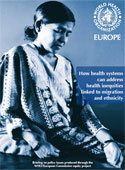How health systems can address health inequities linked to migration and ethnicity

Download
2010, viii + 35 pages
ISBN 978 92 890 0204 2
This publication is only available online.
There are about 75 million migrants in the WHO European Region, amounting to 8.4% of the total population and 39% of all migrants worldwide. Figures for ethnic minorities are not available, because there is little consensus on definitions, but the largest of these groups is probably the Roma, with an estimated population of 12−15 million.
There is substantial evidence of inequities in both the state of health of these groups and the accessibility and quality of health services available to them. Differences from the majority population vary, however, according to the specific group studied, the health problems or services involved, and the country concerned. Some groups may in certain respects enjoy health advantages, but it is mainly disadvantages that are documented.
This briefing describes how, to tackle such health inequities, health systems must not only improve the services available to migrants and ethnic minorities, but also address the social determinants of health across many sectors.



